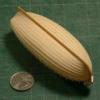-
Posts
13,361 -
Joined
-
Last visited
Content Type
Profiles
Forums
Gallery
Events
Everything posted by druxey
-

Can't be THAT different from knitting... (New Member)
druxey replied to Grisha's topic in New member Introductions
We are duly warned! Welcome aboard, Grisha. -
Parallel tape can be visually deceiving. I'd recommend using black thread and white glue. It's easy to reposition the thread: moisten your finger and roll the thread up or down as needed. And remember to check the work right way up from all angles!
- 399 replies
-
- winchelsea
- Syren Ship Model Company
-
(and 1 more)
Tagged with:
-
Certainly the promotional makes this sound promising. Thanks for bringing our attention to it.
-
Bienvenue, Jacques! Bien fait! (Welcome, Jacques; well done).
-
What a naughty midshipman! Definitely a bad 'un.
-
Silkspan has been used for sails and flags by many model-makers with excellent results.
-
I'm trying to recall what I did here on Polyphemus, but it was nearly 50 years ago when I was building that part of the model! I do know that there was a curved beam forward of the rudderhead. I think I mortised two half-beam/transoms (with a rabbet for the plank ends) into the angles of the counter timbers, but wouldn't swear to this now. That would have been similar to Gary's proposal.
-
Barnham Rider was forgiven all and restored to his rank and position in March, 1811 by the Lords of the Admiralty.
-
Barnham Rider was forgiven and restored to his position in 1811 by the Lords of the Admiralty.
-
Apparently the builder failed in 1807. Somehow Kidwell must have been back in business - maybe! - in 1810. He had been contracted to build Pyramus, 36 guns, later 42, in 1805. After the yard closed, her frames were transported to Portsmouth, where the ship was reassembled and completed. That ad sounds sketchy to me.
-
Welcome! A sloop, dory or pram dinghy might also be good starting points.
About us
Modelshipworld - Advancing Ship Modeling through Research
SSL Secured
Your security is important for us so this Website is SSL-Secured
NRG Mailing Address
Nautical Research Guild
237 South Lincoln Street
Westmont IL, 60559-1917
Model Ship World ® and the MSW logo are Registered Trademarks, and belong to the Nautical Research Guild (United States Patent and Trademark Office: No. 6,929,264 & No. 6,929,274, registered Dec. 20, 2022)
Helpful Links
About the NRG
If you enjoy building ship models that are historically accurate as well as beautiful, then The Nautical Research Guild (NRG) is just right for you.
The Guild is a non-profit educational organization whose mission is to “Advance Ship Modeling Through Research”. We provide support to our members in their efforts to raise the quality of their model ships.
The Nautical Research Guild has published our world-renowned quarterly magazine, The Nautical Research Journal, since 1955. The pages of the Journal are full of articles by accomplished ship modelers who show you how they create those exquisite details on their models, and by maritime historians who show you the correct details to build. The Journal is available in both print and digital editions. Go to the NRG web site (www.thenrg.org) to download a complimentary digital copy of the Journal. The NRG also publishes plan sets, books and compilations of back issues of the Journal and the former Ships in Scale and Model Ship Builder magazines.


